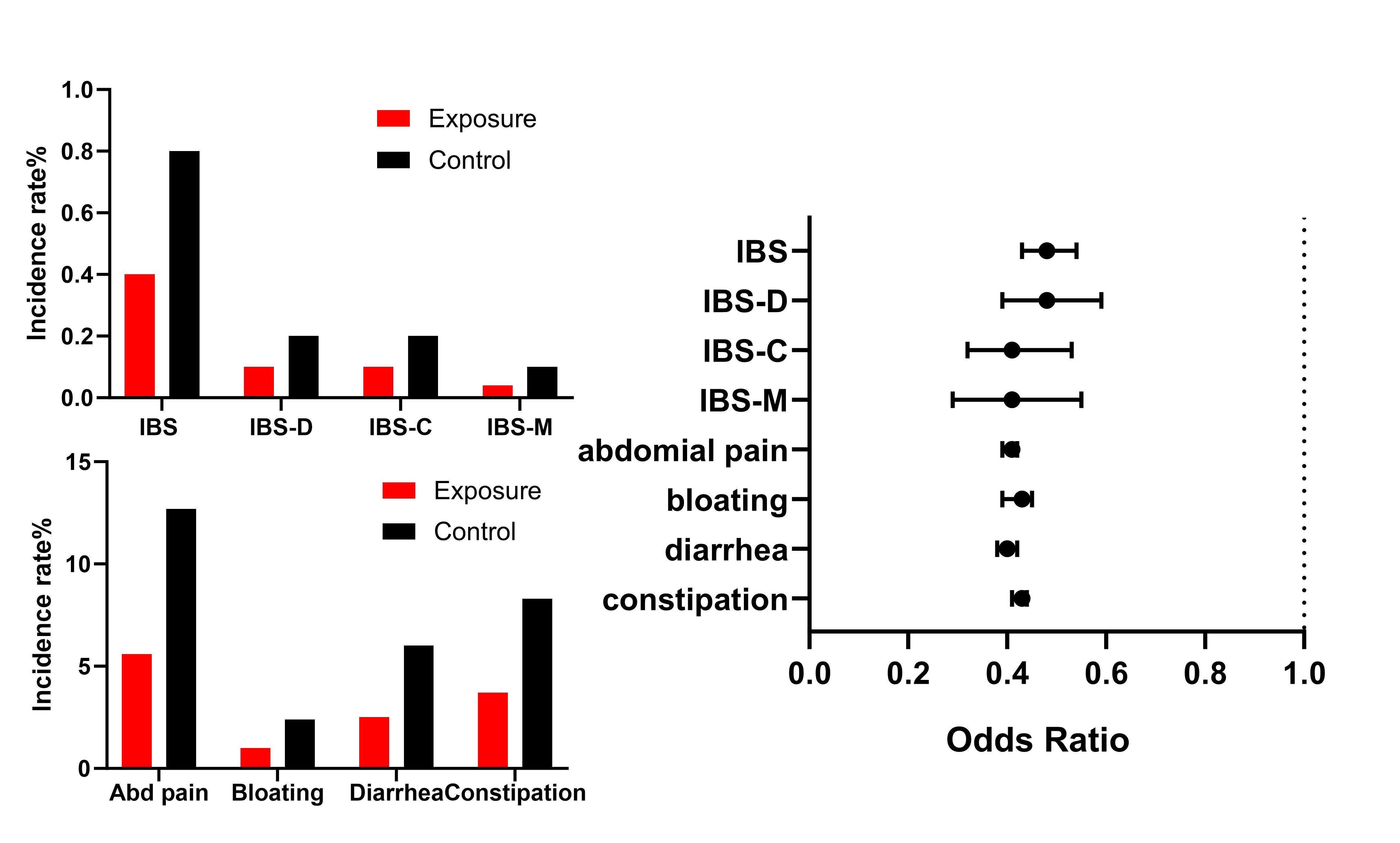Sunday Poster Session
Category: Functional Bowel Disease
P0814 - Association Between SGLT2 Inhibitors and Irritable Bowel Syndrome and Gastrointestinal Symptoms in Non-Diabetic Patients With Chronic Kidney Disease or Heart Failure
Sunday, October 26, 2025
3:30 PM - 7:00 PM PDT
Location: Exhibit Hall

Xiaoliang Wang, MD, PhD (he/him/his)
Cleveland Clinic
Cleveland, OH
Presenting Author(s)
Xiaoliang Wang, MD, PhD1, Jinxiu Pan, MD2, Jiayan Wang, MD, PhD3, Yilin Song, MD4, Darwin Tan, BS2, Yan Sun, MD5, Scott L. Gabbard, MD, FACG6, Gengqing Song, MD7
1Cleveland Clinic, Cleveland, OH; 2Case Western Reserve University School of Medicine, Cleveland, OH; 3Marshall University Joan C. Edwards School of Medicine, Huntington, WV; 4University of Maryland Medical Center, Baltimore, MD; 5Case Western Reserve University / MetroHealth, Cleveland, OH; 6Cleveland Clinic Foundation, Shaker Heights, OH; 7Division of Gastroenterology and Hepatology, Metrohealth Medical Center, Cleveland, OH
Introduction: Sodium–glucose cotransporter-2 inhibitors (SGLT2i) have emerged as key therapies for chronic kidney disease (CKD) and heart failure (HF), including in non-diabetic patients. In addition to their established glucose-lowering and renoprotective effects, SGLT2is exhibit anti-inflammatory and antioxidative properties. Gastrointestinal (GI) symptoms—such as constipation, diarrhea, abdominal pain, and bloating—are common among patients with CKD and HF, potentially due to chronic inflammation and oxidative stress. This study aimed to evaluate the association between SGLT2i use and the incidence of irritable bowel syndrome (IBS) and related GI symptoms in non-diabetic patients with CKD or HF.
Methods: We conducted a retrospective cohort study using TriNetX, a global database of de-identified EHRs from over 101 million patients. Adults diagnosed with CKD or HF in the past five years were identified via ICD-10 codes. The exposure group included patients prescribed SGLT2is; controls had no SGLT2i use. Patients with preexisting or incident diabetes or prior IBS were excluded. Propensity score matching (1:1) was based on age, sex, race, ethnicity, obesity, smoking, psychiatric comorbidities (depression, anxiety), use of GLP-1 agonists, lisinopril, losartan, spironolactone, and history of organ transplant or major GI surgery. We assessed incident IBS (excluding diagnoses within the first six months) and related GI symptoms: abdominal pain, bloating, diarrhea, and constipation. Associations were reported as ORs with 95% CIs.
Results: After matching, each cohort comprised 125,396 patients. SGLT2i use was associated with significantly lower incidence and odds of developing IBS (OR 0.48; 95% CI, 0.43–0.54). Reduced incidence and odds were observed across IBS subtypes: IBS-D (OR 0.48; 95% CI, 0.39–0.59), IBS-C (OR 0.41; 95% CI, 0.32–0.53), and IBS-M (OR 0.41; 95% CI, 0.29–0.55). Additionally, the odds of IBS-related symptoms were lower among SGLT2i users: abdominal pain (OR 0.41; 95% CI, 0.39–0.42), bloating (OR 0.43; 95% CI, 0.39–0.45), diarrhea (OR 0.40; 95% CI, 0.38–0.42), and constipation (OR 0.43; 95% CI, 0.41–0.44).
Discussion: In this large, propensity-matched cohort, SGLT2i use in non-diabetic CKD or HF patients was linked to lower risk of IBS and GI symptoms. While causality can't be confirmed, findings suggest a potential protective effect on GI motility. Prospective studies are needed to confirm and explore mechanisms.

Figure: Incidence and Odds ratio of IBS and related symptoms in Control and SGLT2i use groups over the past 5 years.
Disclosures:
Xiaoliang Wang indicated no relevant financial relationships.
Jinxiu Pan indicated no relevant financial relationships.
Jiayan Wang indicated no relevant financial relationships.
Yilin Song indicated no relevant financial relationships.
Darwin Tan indicated no relevant financial relationships.
Yan Sun indicated no relevant financial relationships.
Scott Gabbard: Gastrogirl – invited podcast talk.
Gengqing Song indicated no relevant financial relationships.
Xiaoliang Wang, MD, PhD1, Jinxiu Pan, MD2, Jiayan Wang, MD, PhD3, Yilin Song, MD4, Darwin Tan, BS2, Yan Sun, MD5, Scott L. Gabbard, MD, FACG6, Gengqing Song, MD7. P0814 - Association Between SGLT2 Inhibitors and Irritable Bowel Syndrome and Gastrointestinal Symptoms in Non-Diabetic Patients With Chronic Kidney Disease or Heart Failure, ACG 2025 Annual Scientific Meeting Abstracts. Phoenix, AZ: American College of Gastroenterology.
1Cleveland Clinic, Cleveland, OH; 2Case Western Reserve University School of Medicine, Cleveland, OH; 3Marshall University Joan C. Edwards School of Medicine, Huntington, WV; 4University of Maryland Medical Center, Baltimore, MD; 5Case Western Reserve University / MetroHealth, Cleveland, OH; 6Cleveland Clinic Foundation, Shaker Heights, OH; 7Division of Gastroenterology and Hepatology, Metrohealth Medical Center, Cleveland, OH
Introduction: Sodium–glucose cotransporter-2 inhibitors (SGLT2i) have emerged as key therapies for chronic kidney disease (CKD) and heart failure (HF), including in non-diabetic patients. In addition to their established glucose-lowering and renoprotective effects, SGLT2is exhibit anti-inflammatory and antioxidative properties. Gastrointestinal (GI) symptoms—such as constipation, diarrhea, abdominal pain, and bloating—are common among patients with CKD and HF, potentially due to chronic inflammation and oxidative stress. This study aimed to evaluate the association between SGLT2i use and the incidence of irritable bowel syndrome (IBS) and related GI symptoms in non-diabetic patients with CKD or HF.
Methods: We conducted a retrospective cohort study using TriNetX, a global database of de-identified EHRs from over 101 million patients. Adults diagnosed with CKD or HF in the past five years were identified via ICD-10 codes. The exposure group included patients prescribed SGLT2is; controls had no SGLT2i use. Patients with preexisting or incident diabetes or prior IBS were excluded. Propensity score matching (1:1) was based on age, sex, race, ethnicity, obesity, smoking, psychiatric comorbidities (depression, anxiety), use of GLP-1 agonists, lisinopril, losartan, spironolactone, and history of organ transplant or major GI surgery. We assessed incident IBS (excluding diagnoses within the first six months) and related GI symptoms: abdominal pain, bloating, diarrhea, and constipation. Associations were reported as ORs with 95% CIs.
Results: After matching, each cohort comprised 125,396 patients. SGLT2i use was associated with significantly lower incidence and odds of developing IBS (OR 0.48; 95% CI, 0.43–0.54). Reduced incidence and odds were observed across IBS subtypes: IBS-D (OR 0.48; 95% CI, 0.39–0.59), IBS-C (OR 0.41; 95% CI, 0.32–0.53), and IBS-M (OR 0.41; 95% CI, 0.29–0.55). Additionally, the odds of IBS-related symptoms were lower among SGLT2i users: abdominal pain (OR 0.41; 95% CI, 0.39–0.42), bloating (OR 0.43; 95% CI, 0.39–0.45), diarrhea (OR 0.40; 95% CI, 0.38–0.42), and constipation (OR 0.43; 95% CI, 0.41–0.44).
Discussion: In this large, propensity-matched cohort, SGLT2i use in non-diabetic CKD or HF patients was linked to lower risk of IBS and GI symptoms. While causality can't be confirmed, findings suggest a potential protective effect on GI motility. Prospective studies are needed to confirm and explore mechanisms.

Figure: Incidence and Odds ratio of IBS and related symptoms in Control and SGLT2i use groups over the past 5 years.
Disclosures:
Xiaoliang Wang indicated no relevant financial relationships.
Jinxiu Pan indicated no relevant financial relationships.
Jiayan Wang indicated no relevant financial relationships.
Yilin Song indicated no relevant financial relationships.
Darwin Tan indicated no relevant financial relationships.
Yan Sun indicated no relevant financial relationships.
Scott Gabbard: Gastrogirl – invited podcast talk.
Gengqing Song indicated no relevant financial relationships.
Xiaoliang Wang, MD, PhD1, Jinxiu Pan, MD2, Jiayan Wang, MD, PhD3, Yilin Song, MD4, Darwin Tan, BS2, Yan Sun, MD5, Scott L. Gabbard, MD, FACG6, Gengqing Song, MD7. P0814 - Association Between SGLT2 Inhibitors and Irritable Bowel Syndrome and Gastrointestinal Symptoms in Non-Diabetic Patients With Chronic Kidney Disease or Heart Failure, ACG 2025 Annual Scientific Meeting Abstracts. Phoenix, AZ: American College of Gastroenterology.
